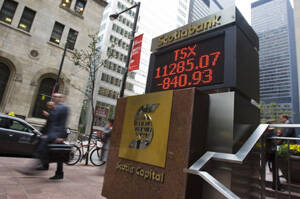Despite the Obama administration’s optimism about the state of the economy, numerous voices and indicators suggest that its main goal, to restabilize the major banks, is neither sufficient nor proper to the problem at hand. The ongoing bank bailout shows no signs of ending soon or of resulting in reform of the sector. Much more serious structural adjustment is necessary, including the orderly failure of some banks.
The Dow Jones industrial average has steadily risen in recent months. Yet the basis for confidence remains unclear. Unemployment continues to rise, the American automotive industry is in tatters, waves of mortgage defaults threaten to bring down small and mid-sized banks, and the economic situation in other parts of the world could very well undermine the world economy further. In a recent article in The Wall Street Journal (5/18) investors interviewed said their increased investments were based on a sense that things were getting “less worse”—not better, but worse at a slower rate. But even these investors signaled that more substantial signs of improvement were required before further investment of any size could occur.
The Obama administration has found reasons to be encouraged in recent months, especially after the recent “stress test” of the banks. Federal demands that certain banks increase the amount of cash they have on hand is an important step toward ensuring their stability; yet as a whole the recent “stress test” appears to have evaluated more their ability to handle mild indigestion than actual stress. The fact that the banks themselves were given some say in how government regulators reported their condition likewise undermines the report’s (and the government’s) credibility. It also points to the truth-is-stranger-than-fiction reality that the very men and women who caused the world financial crisis, whose decisions led to the loss of trillions of dollars and millions of jobs worldwide, continue to do as they please.
Today taxpayer dollars are being spent by bailed-out banks not simply on the bailout, executive salaries and bonuses, but also for lobbying against measures that would protect ordinary people against bad bank practices. Taxpayer bailout money, for instance, helped kill anti-foreclosure legislation that would have allowed judges to revise the terms of unaffordable mortgages. Likewise, in the wake of the passage of the credit card reform bill (against which the banking industry lobbied), some banks have begun spreading the word that they will begin to charge for the use of their cards, yet another way to pass financial responsibility for their mistakes back onto the taxpayers.
Meanwhile knowledgeable economists of various schools of thought continue to insist that the government goal of saving all the banks is neither realistic nor useful. Paul Krugman, winner of the Nobel Prize in economics and a columnist for The New York Times, has described the government’s approach as a new kind of voodoo economics, in which impenetrable financial rituals enable bankrupt banks to continue as institutional zombies, reanimated corpses with no long-term ability to provide for themselves. Another Nobel Prize winner and a former chief economist of the World Bank, Joseph E. Stiglitz, likewise recently said in testimony before the Joint Economic Committee of Congress that the proper question is no longer whether some of these banks are too big too fail, but whether they are too big to save. And Simon Johnson, former economic counselor and director of the research department at the International Monetary Fund, wrote in the May issue of The Atlantic that the current economic situation in the United States closely mirrors the dynamics of the failed economies the I.M.F. regularly encounters in the developing world. The main difference is that in a developing economy, structural change does eventually come, because the government runs out of money. The far deeper pockets of the United States Treasury, on the other hand, are allowing the government to avoid these tough choices. Johnson also believes that bad banks, lacking that financial imperative, are likely to bleed the country and hamper recovery for quite a long time.
Today some banks are holding the government and the country hostage: Continue to bail them out both with money and positive spin, they threaten, or they will bring the economy down. But the orderly, regulated failure of these banks is an important part of economic recovery. It is also a step in the reform of the banking industry. The failure of risky and dishonest practices encourages better practices in the future. President Obama came into office insisting that we need not be trapped in old models, that we can and should think outside the box, that we can make a difference. As for the banking industry, the time has come for the administration to demonstrate that leadership in action.








